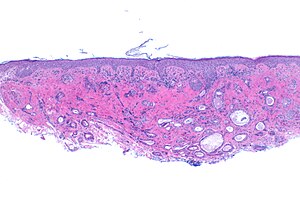Difference between revisions of "Syringoma"
Jump to navigation
Jump to search
| Line 36: | Line 36: | ||
*Benign sweat duct tumour. | *Benign sweat duct tumour. | ||
*Eccrine differentiation. | *Eccrine differentiation. | ||
*Classically lower [[eyelid]].<ref>{{Ref PBoD8|1177}}</ref> | *Classically lower [[eyelid]].<ref>{{Ref PBoD8|1177}}</ref><ref name=pmid17326243/> | ||
*Typical female - female:male = 6.6:1.<ref name=pmid17326243>{{cite journal |authors=Lee JH, Chang JY, Lee KH |title=Syringoma: a clinicopathologic and immunohistologic study and results of treatment |journal=Yonsei Med J |volume=48 |issue=1 |pages=35–40 |date=February 2007 |pmid=17326243 |pmc=2628001 |doi=10.3349/ymj.2007.48.1.35 |url=}}</ref> | *Typical female - female:male = 6.6:1.<ref name=pmid17326243>{{cite journal |authors=Lee JH, Chang JY, Lee KH |title=Syringoma: a clinicopathologic and immunohistologic study and results of treatment |journal=Yonsei Med J |volume=48 |issue=1 |pages=35–40 |date=February 2007 |pmid=17326243 |pmc=2628001 |doi=10.3349/ymj.2007.48.1.35 |url=}}</ref> | ||
Revision as of 04:10, 1 November 2024
| Syringoma | |
|---|---|
| Diagnosis in short | |
 Syringoma. H&E stain. (WC) | |
|
| |
| LM | bilayered cytologically bland ducts with tadpole-like appearance |
| Grossing notes | unoriented skin ellipse grossing, oriented skin ellipse grossing |
| Site | skin, eyelid - see dermatologic neoplasms |
|
| |
| Prognosis | benign |
Syringoma is a benign skin lesion.
General
- Benign sweat duct tumour.
- Eccrine differentiation.
- Classically lower eyelid.[1][2]
- Typical female - female:male = 6.6:1.[2]
Microscopic
Features:[3]
- Proliferation of benign ducts with lined by a bilayer (as in normal sweat ducts) with abnormal architecture:
- Tadpole like appearing ducts.
DDx:
- Syringomatous adenomas of nipple (AKA syringoma of the nipple).[4]
- Chondroid syringoma. (???)
Images
Sign out
A. Right Lower Eyelid Lesion, Biopsy: - Benign syringoma.
See also
References
- ↑ Kumar, Vinay; Abbas, Abul K.; Fausto, Nelson; Aster, Jon (2009). Robbins and Cotran pathologic basis of disease (8th ed.). Elsevier Saunders. pp. 1177. ISBN 978-1416031215.
- ↑ 2.0 2.1 Lee JH, Chang JY, Lee KH (February 2007). "Syringoma: a clinicopathologic and immunohistologic study and results of treatment". Yonsei Med J 48 (1): 35–40. doi:10.3349/ymj.2007.48.1.35. PMC 2628001. PMID 17326243. https://www.ncbi.nlm.nih.gov/pmc/articles/PMC2628001/.
- ↑ URL: http://emedicine.medscape.com/article/1059871-diagnosis. Accessed on: 12 May 2010.
- ↑ Boecker, W.; Junkers, T.; Reusch, M.; Buerger, H.; Korsching, E.; Metze, D.; Decker, T.; Loening, T. et al. (2012). "Origin and differentiation of breast nipple syringoma.". Sci Rep 2: 226. doi:10.1038/srep00226. PMID 22355740.
- ↑ Nosrati, N.; Coleman, NM.; Hsu, S. (2008). "Axillary syringomas.". Dermatol Online J 14 (4): 13. PMID 18627735.





